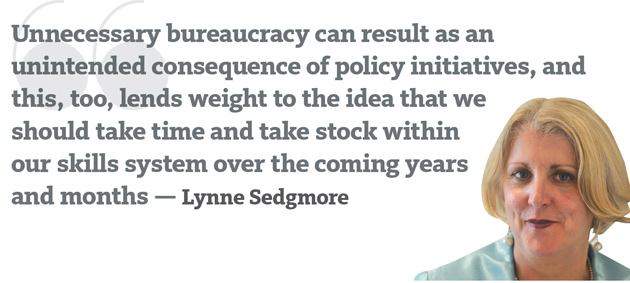More than 1,000 FE and skills staff took part and vast majority revealed concerns about levels of institutional funding.
It was the same story with worries over learner funding.
External bureaucracy worried 95.6 per cent of respondents while the pace and volume of change concerned 91.9 per cent.
The broad government direction of travel for FE concerned 92 per cent and 87 per cent thought the complexity of the sector was an issue.
“Government agencies have to involve the sector in constructive discussions if providers are to meet the challenges which are clearly recognised in this survey”
Stewart Segal, Association of Employment and Learning Providers
“We understand politicians are keen to make a difference, otherwise why do the job, however, they need to be wary of pushing change too quickly with little assessment of what is — and isn’t — working”
Gill Clipson, Association of Colleges
“FE institutions can’t keep doing more with less, and the government must be careful not to undermine its overall objectives by cutting provision which targets those who are hardest to reach”
Sally Hunt, University and College Union
————————————————————————————————————–
Funding tops the bill as the biggest area of concern for the sector in the results of The Great FE & Skills Survey of 2014.
More than 1,000 college leaders, staff and other sector professionals answered questions based on their concerns in various areas affecting FE*.
Middle managers were by far the most engaged with the survey, with more than 30 per cent of the respondents coming from the group. Senior managers made up more than 18 per cent of respondents, while support and admin workers formed the third largest group at just over 15 per cent.
In total, 10 per cent of respondents were tutors or lecturers, 8.8 per cent were principals or chief executives, 7.7 per cent consultants, 7.3 per cent vice principals, while just 1.6 per cent were governors. Six inspectors also responded, which amounts to 0.6 per cent.
Of the respondents, 54.7 per cent spend the majority of their time working in general FE colleges, while 15.3 per cent were from independent or private learning providers. The remaining responses came from adult and community education providers (7.5 per cent), specialist colleges (5 per cent), sixth form colleges (4.1 per cent) and other providers.
Of all the questions, the one which produced the biggest response in the “extremely concerned” category was about institutional funding (fig 1).
Of the 860 people who answered the question 96.5 per cent said they were either somewhat, moderately or extremely concerned about levels or rates of institutional funding. 67.9 per cent were in the “extremely concerned” camp.
This focus on funding has come as no surprise to sector leaders, including Sixth Form Colleges Association (SFCA) deputy chief executive James Kewin.
Mr Kewin said: “We understand that the public finances are in dire straits and the government needs to make spending cuts. But we don’t believe that sixth form students should bear the brunt of these cuts, particularly when they already receive 20 per cent less funding than students in secondary schools.
“[Skills Minister] Matthew Hancock’s comments last week [in FE Week] that all 16 to 19-year-old students are treated exactly the same in funding terms were disingenuous at best. School and academy sixth forms benefit from a VAT rebate (worth more than £250,000 a year to the average sixth form college) in addition to receiving support to meet the costs of their rates and insurance bills.
“Loan repayments are a further drain on the resources of colleges that schools and academies (that receive 100 per cent capital grants) do not have to contend with. Students should receive the same level of investment in their education irrespective of where they choose to study.
“While subjecting existing sixth form colleges to savage spending cuts, the government has found £62m to spend on new, largely unneeded, free school sixth forms and plans to invest £45m on just one Free School sixth form in Westminster.
“It would make educational and economic sense to increase investment in existing sixth form colleges, or at the very least to allow them to compete with their Free School imitators on a level playing field.”
Bureaucracy also seemed to be an area of concern for the sector, with 95.6 per cent of people saying they were concerned about external bureaucracy (figure 3), and 35.6 per cent of people moderately concerned about levels of bureaucracy within their organisations.
Lynne Sedgmore, executive director of the 157 Group, said: “This survey provides a really useful snapshot of the ‘state of the nation’ as far as FE is concerned. It is not surprising that the things which cause most concern are those which directly impact upon the front-line delivery of high quality teaching and learning for all.
“The 157 Group has called for a period of policy stability, and the concern over the pace of change would suggest that many in the sector agree with us.
“Unnecessary bureaucracy can result as an unintended consequence of policy initiatives, and this, too, lends weight to the idea that we should take time and take stock within our skills system over the coming years and months.
“We hope that policymakers and influencers will heed these messages and that a political consensus will emerge which will allow time for the many new initiatives of the last few years to ‘bed down’ and prove their worth in delivering for the economy a skilled workforce and a population eager to learn.”
More than 81 per cent of people said they also had concerns about levels of capital funding available.
Other notable areas of concern were about the pace and volume of change in the sector (figure 4), which 43 per cent of people said they were extremely concerned about, with 92 per cent saying they were concerned to some degree.
More than 84 per cent said they were concerned to some degree about maths and English assessment and delivery (figure 5), and roughly the same proportion said they were concerned in some way about the administrative burden of quality and inspection systems.
Stewart Segal, chief executive of the Association of Employment and Learning Providers, said: “The survey has reinforced the key concerns expressed by our members in our own surveys. Providers are concerned about the pace of change in the sector and the fact that budget and rate reductions create pressures on the ability to respond to learners and employers and the quality of provision.
“Overall 92 per cent expressed a concern about the direction of travel which no doubt reflects the proposals on issues like apprenticeships where the changes are clearly not supported by providers or employers. There are specific concerns about the provision of English and maths and the level of capital support. Private training providers of course have no access to capital funds. Similarly there were major concerns about the levels of bureaucracy and the quality and inspection systems.
“The employment and skills sector remains complex and therefore the pace of change remains a real concern for providers. Government agencies have to involve the sector in constructive discussions if providers are to meet the challenges which are clearly recognised in this survey.”
Perhaps the most telling were responses to broader questions about the sector as a whole and its future. More than 92 per cent said they were concerned to some degree about the “broad government ‘direction of travel’ for FE” (figure 6), with 53.7 per cent saying they were “extremely concerned”.
The complexity of the sector, with the boundary between the Department for Education and Department for Business, Innovation and Skills used as an example, was also concerning to some degree for more than 87 per cent of people (figure 7), with 41.9 per cent saying their concern was extreme.
Stephan Jungnitz, a college specialist for the Association of School and College Leaders (ASCL), said: “We are arguing the case with other sector organisations for an improvement in post-16 funding with ministers. Unfortunately it comes as no surprise that funding worries are such a deep concern among college leaders.
“Government needs to recognise that continuous cuts to post-16 funding are damaging provision. There is a real danger that the government’s stated ambitions for FE will seem like empty rhetoric, as colleges are denied the essential resources. It’s time we had a change. Government needs to recognise that sufficient resourcing for FE is essential for a skills and education system that supports future economic prosperity.”
University and College Union general secretary Sally Hunt said: “Sadly, it is not surprising that those working in FE are seriously concerned about the funding available for their institutions, as well as the general direction of travel in terms of support for the sector. FE institutions can’t keep doing more with less, and the government must be careful not to undermine overall objectives by cutting its provision which targets those who are hardest to reach.”
Click here to view the tables
Click here for an expert piece by Mick Fletcher

——————————————————————————————————————————————————-
Poor management and interpreting rules among list of staff bugbears
he comments of FE professionals who took part in the Great FE & Skills Survey make for gloomy reading, with many lamenting the direction in which the sector is heading.
Hundreds of respondents used survey response sections for extra comment to anonymously vent frustration — and many focused on funding.
Anger in the comments has been directed at politicians, government departments, and even at badly-run colleges.
One respondent said: “Rates of funding are complex and subject to change for political rather than educational motives. The FE sector is under-funded when compared to either higher education or school sectors. This is reflected in a general contempt for “skills” as somehow second class rather than the lifeblood of our economy.”
Another said: “At a time when post-16 education is becoming compulsory it seems crazy to be cutting rates and reducing payments. Furthermore we have a number of students who are 18 going into their second year of a level three course, having not known what to do initially in year 12 and changing tact. To then further cut funding for these students seems unjust and not a positive way of ensuring the skills required by the nation are met.”
And another wrote: “There is too little information made available to enable an informed response from anyone. Changes are implemented without real forethought only to be retracted (also without informing those on the ground) — this is a huge waste of public funds that could be better spent on providing learning opportunities.”
Comments also focused on difficulties faced by colleges and independent learning providers battling red tape.
One respondent wrote: “I see no evidence, despite decades of ‘bureaucracy-busting taskforces’ et al that external bureaucracy has improved. Civil servants seem to delight in creating ever-more impenetrable funding mechanisms which would be far more effective if simpler.”
Another said: “The cost of employing specialists to translate the funding system is a necessary overhead, but just goes to reinforce that the sector spends too much time having to interpret the rules rather than focusing on delivering excellent learning opportunities.”

And others painted a pessimistic picture of a future without government funding for FE.
One said: “My vision of the future is that there will be no adult funding at all, and that all our provision will have to be full cost or funded via student loans. While this is a concern to the college as a business, it should also be a concern to all adults who have long bought into the ‘lifelong learning’ education system we have nurtured over many years.”
Some respondents highlighted problems in FE institutions, and said poor leadership was partly to blame for problems.
One said: “Over the years funding has been made too readily available to those clearly inadequate to deliver. Funding should be made available to those organisations that can clearly and transparently show that they have good success at being able to deliver quality provision.”
Another wrote: “Senior managers in FE have become very poor at leading, strategy, commercially focussed, people skills, are general focussed on international politics and covering their backs, with a single track management skills and not a broad range of skills. The FE sector badly needs commercially focussed leaders who understand business and have had business and commercial exposure.”
——————————————————————————————————————————————
Survey success could become an annual event
The Great FE and Skills Survey of 2014 was carried out by the Policy Consortium in partnership with FE Week and is expected to be run again next year.
The online survey closed on April 4 having been open for a fortnight, during which time 1,091 responses were registered.
It posed a range of questions relating to the levels of concern about certain problems faced by the sector, such as funding, bureaucracy and quality of provision.
By asking people to rate the level of concern, it uncovered the most and least worrying areas for the sector.
And by cross-referencing the answers to the survey with the context of who was answering it, the Policy Consortium has produced a quantitative analysis of the results.
The analysis shows not just what the sector worries about as a whole, but what areas worry specific types of providers, and what those in different job roles see as priorities.
Visit policyconsortium.co.uk for the full 34-page report on the survey results



















